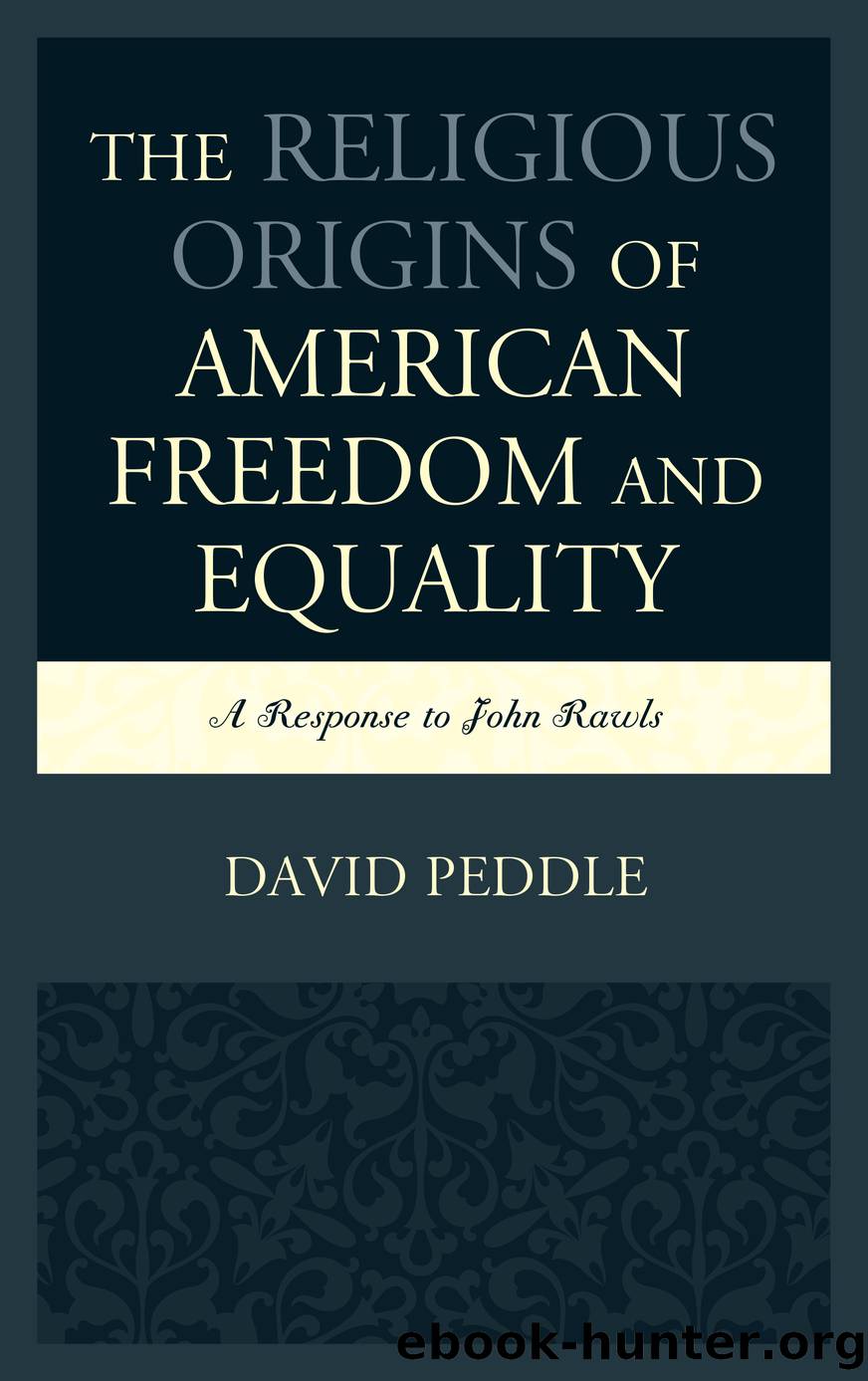The Religious Origins of American Freedom and Equality by Peddle David;

Author:Peddle, David;
Language: eng
Format: epub
Tags: undefined
Publisher: Lexington Books
Published: 2012-08-15T00:00:00+00:00
The Kantian emphasis on the hegemony of the moral will is, in some respects, a direct descendant in philosophical form of this Calvinist perspective. Kant states, âAll moral concepts have their seat and origin completely a priori in reason, and indeed in the most ordinary human reason just as much as in the most highly speculative. They cannot be abstracted from any empirical, and hence merely contingent, cognition.â[139]
Finally both standpoints are critical of âjustification by works,â and both conceive inward freedom and conscience to provide a basis for treating others as spiritual and moral beings. For Calvin, the self-denial involved in true conscience brings one into relation to a common good and âforms us to a fair-mindedness and tolerance.â[140] This is a precursor of the fundamental universality of the moral law on the Kantian position: âMan is subject only to his own, yet universal, legislation and . . . he is bound only to act in accordance with his own will which is, however, a will proposed by nature to legislate universal laws.â[141] For Kant, this provides the basis on which we may respect human dignity, and treat humans as self-legislators in a kingdom of ends.[142] Clearly, Kant develops a liberal conception of the ground of fairness and toleration, and Calvin does not. Nonetheless it is telling that these principles have significance for both thinkers, and in both thinkers these conceptions are related to the inwardness of conscience.
Likewise, on the views of both Calvin and Kant, the possibility of morality is grounded in immortality and in Godâs existence. Kant argues that the perfect holiness commanded by the moral will cannot be accomplished in the course of earthly life because it requires âan endless progress to that complete fitness.â Further, âThis infinite progress is possible . . . only under the presupposition of an infinitely enduring existence and personality of the same rational being; this is called the immortality of the soul.â[143] Also, he argues that the moral law requires that we hypothesize the existence of God in order to ground the concept of the highest good.[144] Here Kant articulates his notion of ârational faith.â The conception of God, he argues is a practical need, a âsubjective necessityâ and as such âit can be called faith and even pure rational faith, because pure reason alone (by its theoretical as well as practical employment) is the source from which it springs.â[145] Both Kant and Calvin, therefore, see a necessary connection between the concept of moral goodness and faith in God.
Kantian freedom, then, shares with Calvinist freedom a distinction from the externality of nature, culture and consequence. There is a yet further dimension in which Kantâs concept parallels that of Calvin, that is, in the structure of its concept of positive freedom. For Calvin, freedom is not to be defined merely as choice but as a capacity for obedience to God. For Kant, the relation of will to moral law is likewise essential to freedom. He states, âThe Freedom of the act of
Download
This site does not store any files on its server. We only index and link to content provided by other sites. Please contact the content providers to delete copyright contents if any and email us, we'll remove relevant links or contents immediately.
Getting It, Then Getting Along by L. Reynolds Andiric(610)
Global Justice, Christology and Christian Ethics by Lisa Sowle Cahill(387)
Religion and Politics Beyond the Culture Wars : New Directions in a Divided America by Darren Dochuk(387)
Positive Psychology in Christian Perspective: Foundations, Concepts, and Applications by Charles Hackney(324)
Forgiveness and Christian Ethics by Unknown(308)
Douglas Hamp The First Six Days by Unknown(210)
Christian Martyrdom and Christian Violence by Matthew D. Lundberg;(201)
The Oxford Handbook of Greek and Roman Mythography by R. Scott Smith;Stephen M. Trzaskoma;(194)
Beyond Heaven and Earth by Gabriel Levy(188)
God and Eros by Patterson Colin;Sweeney Conor;(187)
The Bloomsbury Reader in Christian-Muslim Relations, 600-1500 by David Thomas;(186)
Insurgency, Counter-insurgency and Policing in Centre-West Mexico, 1926-1929 by Mark Lawrence(185)
The Horrors and Absurdities of Religion by Arthur Schopenhauer(181)
Cult Trip by Anke Richter(172)
Witches: the history of a persecution by Nigel Cawthorne(171)
Autobiography, Volume 2: 1937-1960, Exile's Odyssey by Mircea Eliade(171)
The Myth of Disenchantment by Jason A. Josephson-Storm(156)
An Introduction to Kierkegaard by Peter Vardy(154)
The Believer by Sarah Krasnostein(151)
